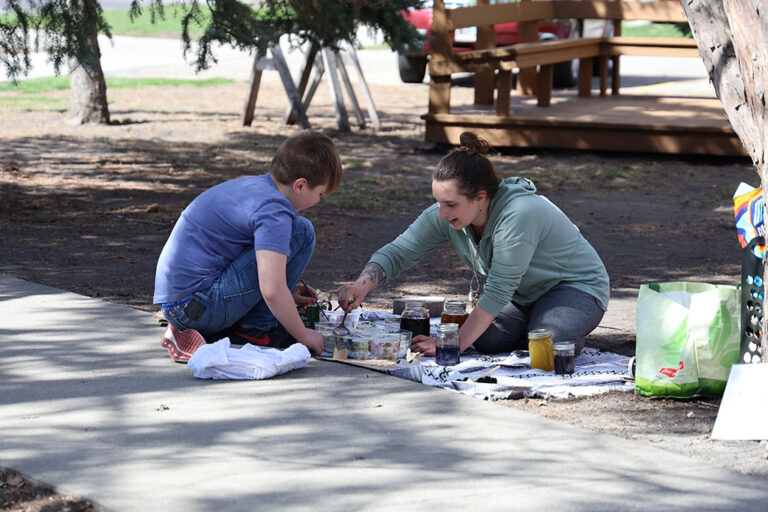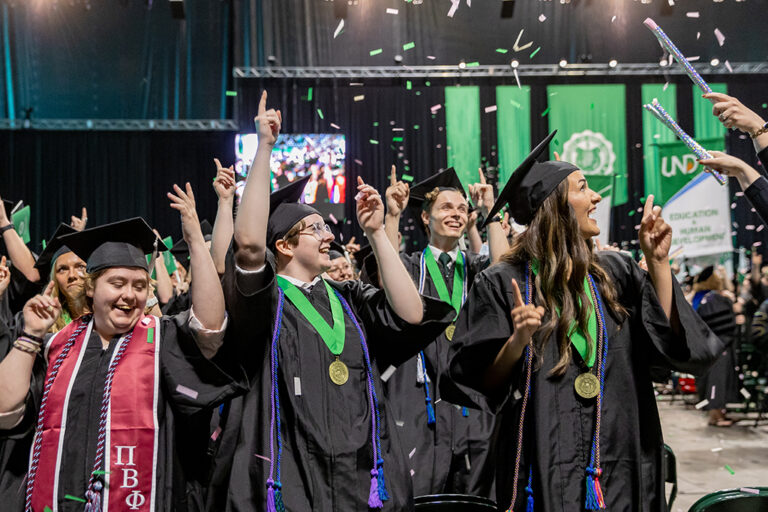Prevailing through a pandemic
UND continues progress and growth, say leaders at spring University Council meeting
There’s a lot of good news despite the COVID-19 pandemic, said campus leaders at the spring University Council meeting.
The meeting, which was held April 27 via Zoom, was led by Liz Legerski, University Senate chair and associate professor of sociology.
“This year has been hard,” Legerski said. “Thank you for your hard work and dedication to UND.”
In addition to updates from several colleges, the meeting featured comments from President Andy Armacost and a legislative update.
Transitioning to a post-vaccine world
“Thanks to everyone for their support during a really tough year,” President Armacost said. “I appreciate the campus support for so many activities, and the tremendous focus on students. Our students are why we exist as a University. Thanks for putting them front and center.”

The physical campus continues to evolve just as UND’s programs have, Armacost said, noting that the Memorial Union, Nistler College, and renovation of University Avenue look awesome.
He added that UND is working to give students more modern living spaces with a proposed public-private partnership that would alter the Wilkerson complex with new construction and renovation of existing residence halls.
“I think we’re making an important transition from our COVID world to a post-vaccine world,” Armacost said. “I’m looking forward to the campus opening this fall and the chance to engage with you face-to-face.”
Technology and Zoom have enabled connection and participation, and Armacost noted that UND has used Zoom to host guest speakers, faculty lectures, the Writers Conference (twice), concerts, plays, and meetings, and congratulated new UND Chester Fritz Distinguished Professors Vasyl Tkach and Daphne Pedersen, who learned of the honor via surprise Zoom events with their departments.
“Vasyl and Daphne exemplify what we should all aspire to, and that’s excellence in the spirit of teaching, scholarship and service,” he said. “I appreciate the passion all of you show for the university, for your disciplines, and most of all for your students.”
Armacost said he intends to update the 2017 UND Strategic Plan, which runs through 2022, by modifying the current plan’s goals and adding new initiatives. He would like to have the new plan in place by April 1 of next year.
He also addressed his vision for a campus that is rooted in a strong sense of respect.
“I have seen cases where conversations have become unproductive, and in some cases downright hostile,” he said. “I’ve heard examples from others, and I’ve seen examples myself, of individuals on our campus treating other faculty members and staff members with profound disrespect. Let me offer an important reminder that is described nicely in the AAUP Statement on Academic Freedom from 1940, that offers us the chance to examine and to embrace the notion of civility. Let me challenge you, as individuals and also as a group, to commit yourselves to respectful dialogue and behavior. Listening to understand others requires an important element of patience, and an appreciation for the ideas of others. If we hold to this tenet, I think we become a better campus. It’s also the foundation of building a more equitable and inclusive campus. I look forward to the campus fully involved in approaching that challenge, fully recognizing the many perspectives and backgrounds that exist within our campus community. And particular thanks to Professor Tamba-Kuii Bailey and Provost Debbie Storrs for their work with the deans to consider these important changes.
“Let me offer my thanks to all of you for your incredible support to each other, and to the local community during this really difficult year,” Armacost continued. “Let’s work together to create meaningful opportunities for our students in the upcoming year, and look for opportunities for our own personal growth. Our campus should and must exude the excitement of creativity, discovery, and learning. This is what it means to be a great university.”

Higher ed funding
The North Dakota Legislature’s main higher education funding bill has been signed by Gov. Burgum, said Jed Shivers, vice president for finance & operations.
“It’s important to recognize where we were at the start of the legislative session,” Shivers said, adding that in January, the outlook for North Dakota’s economy was negative and there was a lot of uncertainty due to the pandemic.
“Sales tax was down, we were in a depressed oil market, there were depressed commodities,” Shivers said, noting that the governor’s initial proposal cut higher ed funding.
The State Board of Higher Education advocated a needs-based budget, and as the economic outlook improved and data showed the state doing better than forecast, the final bill contains a merit pool of 1.5 percent and 2 percent during the biennium for raises, fully paid health insurance, and the ability to match dollars for a capital building fund.
It also contains money for the Nistler construction and authorizes, but does not fund renovation of Merrifield and Twamley Halls.

Though not finalized, several different bills include funding for the State Energy Research Center at the EERC, energy research, Space Force, the UND Aerospace airport flight apron, and more, said Peter Johnson, director of government relations & public affairs for the UND Alumni Association & Foundation.
There is also a bill to continue the Challenge Grant match program, a 2:1 match used for scholarships and endowed chairs. UND would have access to $1.7 million, and the SMHS to $1.5 million. The UND Alumni Association & Foundation works to raise the dollars used for the challenge grant matches. He said UND and Grand Forks benefit greatly from local legislators who are highly effective and work well together in the interests of UND, Grand Forks, and North Dakota as a whole.
Johnson also noted that the challenge grant bill would prohibit North Dakota state-funded universities from engaging in contracts, sponsoring, or partnering with organizations which provide abortions, and that a campus free speech bill was passed despite opposition from the North Dakota University System.

Flourishing graduate programs
Deans from five colleges – Nistler College of Business & Public Administration, Education & Human Development, School of Medicine & Health Sciences, Nursing & Professional Disciplines, and Graduate Studies – gave updates during the meeting.
Graduate enrollments have increased during the pandemic, and most colleges have moved entire majors online with positive outcomes. All are working to recruit and retain students, with a focus on diversity and inclusion.
Dean Amy Henley, Nistler College, noted that enrollment in all four graduate programs is flourishing, up 46 percent. New building construction is ahead of schedule and the Nistler should open in April 2022. The college is focusing on recruiting more women and under-represented students.
Education & Human Development is one of the first in the U.S. to offer a bachelor’s degree in Indigenous language education, said Dean Cindy Juntunen. She also noted that the college is providing telepsychology services to several NDUS colleges which are not able to offer those services on their campuses. They are exploring the possibility of offering several new majors, including e-sports, and emphasizing service to rural communities, as well as forming an equity and justice task force.

Dr. Joshua Wynne reported that the School of Medicine & Health Sciences is becoming even more of a destination for health career students, and that the number of medical student graduates who choose to practice in North Dakota has increased from the 24th percentile to the 70th in the last decade. Despite intense competition, research funding has grown by 5 percent a year for the past decade, and the School received almost $300 million in external grants from 2007-2020. The School is focusing on being the best community-based medical school in the U.S., with a strong commitment to rural and American Indian students. The School recently launched the world’s first doctoral program in Indigenous health.
Nursing & Professional Disciplines received permission to increase enrollment in the nursing program, said Dean Diana Kostrzewski, and enrollment is strong. The biggest challenge, which they have met successfully, was to move experiential learning online. She noted that students helped administer COVID-19 tests and vaccinations, and that the first floor of the Nursing building will be updated over the summer.
Chris Nelson, associate dean of graduate studies, noted that graduate enrollment has had strong growth, and they’ve set records over the past three semesters. He discussed the Accelerate to Industry program, which helps prepare students for employment and builds connections. He noted that fewer than 40 percent of Ph.D. grads find jobs in academia, and the program prepares them for other careers. The Gershman Graduate Center will hold a ribbon-cutting ceremony July 29, and will open to graduate students Aug. 2. The School is offering diversity fellowships to help recruit and retain students.


